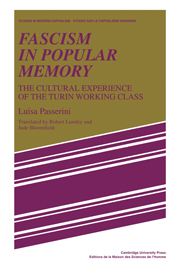II - ORAL SOURCES AND THE HISTORY OF GRASS-ROOTS CULTURAL FORMS
Published online by Cambridge University Press: 04 August 2010
Summary
In this part we examine conceptions of the world and of oneself that have already been glimpsed in the analysis of cultural identities, only here they are seen as they appear in the daily, anonymous acts of subversion of the Fascist period. These include jokes, songs, graffiti, obscenities, etc. The memories of the subjects, supported by the evidence of police records, contribute to a history that highlights the cultural conflict involving opposing views of the world. Commonsense notions of Fascism contain a kernel of truth but they need to be adequately contextualised rather than used to reconstruct events or provide an overall historical assessment.
Instead of seeing these minor incidents of subversion as being insufficiently political and merely regressive in form, they are seen as conflicts with a meaning, even if this is not self-evident. Treating everyday cultural phenomena as important does not mean isolating them from politics; on the contrary, the processes dealt with here reveal the temporary and shifting nature of the boundaries between politics and everyday life, pointing to the considerable areas previously segregated and marginalised that became open to politicisation. Hence the demands for the restoration of the original independence of everyday cultural forms in response to the violent, coercive and disguised politicisation carried out in the Fascist period. This opposition, moreover, can be seen to extend to all processes of politicisation in which overwhelming priority is given to one area of life over another (e.g. the economic over the cultural).
- Type
- Chapter
- Information
- Fascism in Popular MemoryThe Cultural Experience of the Turin Working Class, pp. 65 - 66Publisher: Cambridge University PressPrint publication year: 1987



